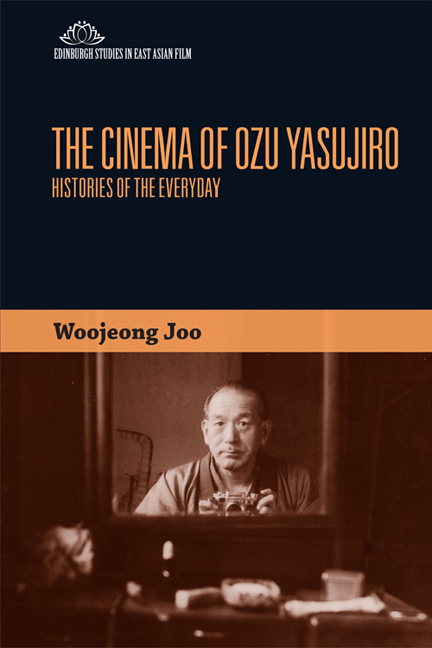Book contents
- Frontmatter
- Contents
- List of Figures
- List of Tables
- Acknowledgements
- Introduction: Ozu, History and the Everyday
- 1 Early Ozu: Shōshimin Film and Everyday Realism
- 2 Ozu in Transition: The Coming of Sound and Family Melodrama
- 3 Wartime Ozu: Between Bourgeois Drama and National Policy Film
- 4 Postwar Ozu: Ozu's Occupation-era Film and Tokyo Regained
- 5 Late Ozu: New Generation and New Salaryman Film
- Conclusion
- Notes
- Glossary of Japanese Terms
- Select Filmography
- Select Bibliography
- Index
5 - Late Ozu: New Generation and New Salaryman Film
Published online by Cambridge University Press: 07 December 2017
- Frontmatter
- Contents
- List of Figures
- List of Tables
- Acknowledgements
- Introduction: Ozu, History and the Everyday
- 1 Early Ozu: Shōshimin Film and Everyday Realism
- 2 Ozu in Transition: The Coming of Sound and Family Melodrama
- 3 Wartime Ozu: Between Bourgeois Drama and National Policy Film
- 4 Postwar Ozu: Ozu's Occupation-era Film and Tokyo Regained
- 5 Late Ozu: New Generation and New Salaryman Film
- Conclusion
- Notes
- Glossary of Japanese Terms
- Select Filmography
- Select Bibliography
- Index
Summary
After Tokyo Story, Ozu interestingly began to replay the prewar genre of shōshimin film, starting with Sōshun/Early Spring (1956) and continuing with Equinox Flower (1958), Good Morning (1959), Late Autumn (1960), until his last film An Autumn Afternoon (1962). Not only do these films constitute the majority of Ozu's post-Tokyo Story works, but they are also some of the most familiar and accessible Ozu films for general viewers today. However, although dealing with the similar subject matter of a salaryman's family life, they are substantially diff erent from the genre of shōshimin film, which invariably focused upon the specifi c historical conditions of the 1930s Depression era. As products of the late 1950s and early 1960s, the aforementioned films thus cannot be called ‘shōshimin film’ according to its exact definition. Nor would I directly apply the categorisation of hōmudorama (home drama) to these late Ozu films. Calling them instead ‘new salaryman films’, I will explore in this chapter the potential for diff erentiating them from any established generic terms and re-situating them within the context of Ozu's postwar films as I have discussed them so far.
This means that the primary problematic of Ozu's postwar oeuvre – the uneasy coexistence of distinct temporal consciousness, where past history and the present everyday overlap – continues to play. Intergenerational conflict already existed in the prewar shōshimin film, as seen in I Was Born But …, but it became much more complex in the postwar period, when the conflict between generations obtained wider historical implications. The younger generation of the post-Tokyo Story films, as portended in The Flavour of Green Tea over Rice, tended to lose this attitude and to step further away from the memory of war and into the present everyday life. The first section of this chapter will focus on the emergence of this new generation in Japanese society, within the film industry, and in Ozu's films.
- Type
- Chapter
- Information
- The Cinema of Ozu YasujiroHistories of the Everyday, pp. 186 - 208Publisher: Edinburgh University PressPrint publication year: 2017



